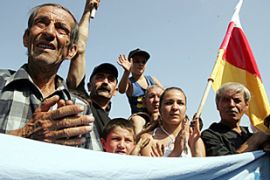Separatists in appeal to Russia
Tens of thousands of people in South Ossetia and Abkhazia call for independence.

Russia says its military intervened in Georgia to protect the many Russian citizens resident in South Ossetia.
Mikheil Saakashvili, Georgia’s president, who is backed by the United States, has accused Moscow of invading his country and of reneging on promises to pull back Russian troops.
‘Bloody aggressor’
Kokoity called for a minute of silence “in the memory of the heroes, of our brothers and sisters savagely murdered by the bloody aggressor”.
Earlier, tens of thousands of people had gathered on the main square in the Abkhazian capital Sukhumi, to support the appeal to Russia.
South Ossetia and Abkhazia broke from Georgian government control during wars in the early 1990s.
Moscow has issued Russian passports to most people in the two territories.
The calls for independence appear to be a move to emphasize a definitive break from Georgia, and not annexation by Russia, that is the desired goal of the separatists.
Russia has cited the recent unilateral declaration of independence by Kosovo, the former Serbian province, as setting the legal precedent for a similar move by Georgia’s breakaway regions.
Russian support
Local officials, supported by Russia, organised a day of events in South Ossetia.
Valery Gergiev, the celebrated Russian conductor, who has family origins in the province, was among those who performed at a concert in Tskhinvali.
An emergency session of Russia’s upper house of parliament on the issue of the breakaway provinces is set for Monday.
Abkhazia’s self-styled parliament yesterday issued a fresh plea for Russian
recognition of its independence and called for the establishment of a permanent Russian military base in the region.
In the debate preceding the unanimous vote, the separatist politicians said relations with Georgia had been poor since 1920 and the recent conflict in South Ossetia had shown good relations could not be achieved with Georgia.
‘No pullout’
Meanwhile, despite recent assurances by Dmitry Medvedev, Russia’s president, that Russia would withdraw its troops to South Ossetia and a security zone defined by a 1999 agreement, there has been little evidence of a Russian pullout.
Jonah Hull, Al Jazeera’s correspondent in Georgia, said: “There are Russian troops in evidence all the way from Gori [Georgia’s second city] to South Ossetia.
 |
| There has been little evidence of Russia withdrawing from Georgia [AFP] |
“They are looking very settled and building permanent structures. They are giving no indication that they are going to move.”
Alexander Stubb, the Finnish foreign minister and chairman of the Organisation for Security and Co-operation in Europe (OSCE), also said he had seen no sign of Russian troops leaving Gori.
“Certainly here on the road we have seen lots of [Russian military] personnel,” he said.
OSCE monitors arrived in Tbilisi, the Georgian capital, on Thursday.
The team of 20 observers will be ready by Monday to start monitoring a ceasefire between Georgia and Russia, said Stubb.
“By Monday most of the equipment will be in place, especially the armoured vehicles, we will have our staff here, we will have our operational centre set and we can start sending out monitors into various parts in Georgia and adjacent to South Ossetia,” he said.
Syrian backing
Meanwhile, Bashar al-Assad, Syria’s president, has backed Russia’s military action against Georgia, following talks with Medvedev on Thursday that were expected to cover sales of Russian arms to Damascus.
A diplomatic source in Moscow told Russia’s Interfax news agency that Russia and Syria were preparing deals involving anti-aircraft and anti-tank missile systems
The two leaders met at Medvedev’s Black Sea residence of Bocharov Ruchei.
Al-Assad said: “We understand the essence of the Russian position and its military response. We believe Russia was responding to the Georgian provocation.”
Russia’s envoy to Nato confirmed on Thursday that Moscow had temporarily frozen military co-operation with the alliance.
Dmitry Rogozin said that the Russian leadership is to hold a meeting on Friday to make a formal decision on its relations with the alliance in the wake of the Georgia crisis.
He said: “Co-operation with Nato is a complex issue and until the Russian political leadership makes a decision on its future, the defence ministry has frozen military co-operation with the alliance.”